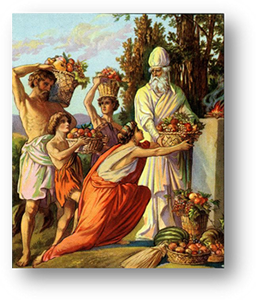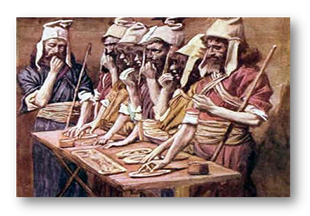
Biblical Tithing
The concept of tithing in the church today is
greatly distorted from the biblical model.
The New Testament does not directly endorse tithing,
yet this law (in a simplified adapted form) is
apparently still a part of the church today.
Today, most people fully reject laws such as the
Sabbath (Matt. 12:11-12, Luke 6:5), Holydays (Luke
2:41-42, Acts 18:21), and the sacrificial system (Acts 21:26,
Acts 24:17), yet these laws are directly cited in
the New Testament. It appears that the church today
is accepting the word of God as it pleases. If
we like a certain law we will find a way to make it
still valid, but if we do not, then we claim that it
has been nailed to the cross with Jesus.
endorse tithing,
yet this law (in a simplified adapted form) is
apparently still a part of the church today.
Today, most people fully reject laws such as the
Sabbath (Matt. 12:11-12, Luke 6:5), Holydays (Luke
2:41-42, Acts 18:21), and the sacrificial system (Acts 21:26,
Acts 24:17), yet these laws are directly cited in
the New Testament. It appears that the church today
is accepting the word of God as it pleases. If
we like a certain law we will find a way to make it
still valid, but if we do not, then we claim that it
has been nailed to the cross with Jesus.
The truth is, "man shall not live by bread alone, but by every word of God" (Luke 4:4). Every commandment, statute, and judgment of God is relevant to the church today and should be practiced, including tithing. The problem is that we have lost the true meaning of these concepts and have, "forgotten the law of thy God" (Hos. 4:6). Tithing is a practice that is beneficial to man. After all, God promises a blessing to those that give of His tithes (Mal 3:10).
What is a Tithe?
This is a simple question. To answer this question we simply need to look up the Hebrew word. The word for tithe is, ma‛ăśêr ma‛ăśar ma‛aśrâh, which means, "a tenth" (Strong's Dictionary - H4643). This word is first used in reference to Abram tithing with Melchizedek (Gen 14:18-20). It is confirmed in the Law of God in the book of Leviticus (Lev. 27:30). A tithe is simply giving a tenth of your increase (what you might call income today) to God. “Three times in a year shall all thy males appear before the LORD thy God in the place which he shall choose; in the feast of unleavened bread, and in the feast of weeks, and in the feast of tabernacles: and they shall not appear before the LORD empty” (Deut. 16:16). Three times a year at the Feast of Unleavened Bread, the Feast of Weeks, and the Feast of Tabernacles all of Israel was to appear before the LORD, but they were not to come empty handed. This begs the question, what were they to bring? “Thou shalt truly tithe all the increase of thy seed, that the field bringeth forth year by year. And thou shalt eat before the LORD thy God, in the place which he shall choose to place his name there, the tithe of thy corn, of thy wine, and of thine oil, and the firstlings of thy herds and of thy flocks; that thou mayest learn to fear the LORD thy God always” (Deut. 14:22-23). Israel was to bring their tithes to the Temple. An interesting point to make is this, all the tithes mentioned are to be offered to the LORD. Tithing is part of the sacrificial system. Under the Mosaic Law the tithe went to the priesthood, which was the civil service of God. The Israelites paid one tenth of their increase to the priesthood through the sacrificial system.
The sacrificial system involves an altar. The Tabernacle had a
Bronze Altar for the people to pay their tithes and offerings
 (Ex.
27:1-8). This altar was at Jerusalem, which was the capital of the
nation. Most students of the scripture are familiar with this
Bronze Altar, however, there is another altar that receives very little
attention. "An altar of earth thou shalt make unto me, and
shalt sacrifice thereon thy burnt offerings, and thy peace offerings,
thy sheep, and thine oxen: in all places where I record my name I will
come unto thee, and I will bless thee" (Ex. 20:24). If the
Bronze Altar was in the Tabernacle, where are the "altar[s] of earth?"
Although the scripture does not directly say, these altars were at the
gates of every city. Here is how we can know this. When a
man is tried and found guilty of a sin/crime, they owe a sin offering.
"And if any one of the common people sin through ignorance, while he
doeth somewhat against any of the commandments of the LORD concerning
things which ought not to be done, and be guilty; or if his sin, which
he hath sinned, come to his knowledge: then he shall bring his offering,
a kid of the goats, a female without blemish, for his sin which he hath
sinned" (Lev. 4:27-28). After a trial a sin offering is given.
Since sin offerings were offered at the Tabernacle, the obvious question
is this, could the Tabernacle house every trial of Israel? Since
it is estimated that over 2.5 million people were in the Exodus, all
trials could not have been held at the Tabernacle.
The scripture says the trials of each city were held at the city gates
(Deut. 21:18-21). This is the
judicial system of the cities. The altars must have been there so
the guilty could pay their sin offering. What we have is a
multi-tiered Judicial System. The cities had their judicial altars
at their gates and the nation had their judicial altar at the
Tabernacle. Tithing paid for this system and more. In fact,
within the Mosaic Law, you can see that there are
three tithes commanded for us to give.
Although the scripture does not call them first,
second, and third tithe, I will do so in this
article so as to provide a clear distinction between
them.
(Ex.
27:1-8). This altar was at Jerusalem, which was the capital of the
nation. Most students of the scripture are familiar with this
Bronze Altar, however, there is another altar that receives very little
attention. "An altar of earth thou shalt make unto me, and
shalt sacrifice thereon thy burnt offerings, and thy peace offerings,
thy sheep, and thine oxen: in all places where I record my name I will
come unto thee, and I will bless thee" (Ex. 20:24). If the
Bronze Altar was in the Tabernacle, where are the "altar[s] of earth?"
Although the scripture does not directly say, these altars were at the
gates of every city. Here is how we can know this. When a
man is tried and found guilty of a sin/crime, they owe a sin offering.
"And if any one of the common people sin through ignorance, while he
doeth somewhat against any of the commandments of the LORD concerning
things which ought not to be done, and be guilty; or if his sin, which
he hath sinned, come to his knowledge: then he shall bring his offering,
a kid of the goats, a female without blemish, for his sin which he hath
sinned" (Lev. 4:27-28). After a trial a sin offering is given.
Since sin offerings were offered at the Tabernacle, the obvious question
is this, could the Tabernacle house every trial of Israel? Since
it is estimated that over 2.5 million people were in the Exodus, all
trials could not have been held at the Tabernacle.
The scripture says the trials of each city were held at the city gates
(Deut. 21:18-21). This is the
judicial system of the cities. The altars must have been there so
the guilty could pay their sin offering. What we have is a
multi-tiered Judicial System. The cities had their judicial altars
at their gates and the nation had their judicial altar at the
Tabernacle. Tithing paid for this system and more. In fact,
within the Mosaic Law, you can see that there are
three tithes commanded for us to give.
Although the scripture does not call them first,
second, and third tithe, I will do so in this
article so as to provide a clear distinction between
them.
The First Tithe:
The first tithe is given to the Levites. Ten
percent of all increase was to be given to the
Levitical Priesthood for their work in the
Tabernacle (Num. 18:20-21). There are four
purposes for the Levitical Priesthood and
Tabernacle. First, the Levites worked
in the Tabernacle to deal with the sins/crimes of
all the people. If someone had
 a dispute
against their brethren they would bring the matter
before the judge/priest in the Holy Place. A
judgment would be given and a fine/sacrifice might
be sentenced. This is the Sin and Trespass
Offerings of Leviticus four and five. For more
on the offerings please read my article
Biblical Offerings
or watch my video
The Tabernacle Offerings. Second, the Levites were
the physicians of ancient Israel and the Temple
system was the hospital. Leviticus 13:2 says
“When a man shall have in the skin of his flesh a
rising, a scab, or bright spot, and it be in the
skin of his flesh like the plague of leprosy;
then he shall be brought
unto Aaron the priest, or unto one of his sons the
priests.” Some of the levitical priests
were physicians and dealt with the sick. This
is God's hospital system. Third, the
Levites regulated food. The last verse in
the chapter covering the Peace Offerings says, “It
shall be a perpetual statute for your generations
throughout all your dwellings,
that ye eat neither fat
nor blood.” The purpose for the Peace
Offerings were to keep the people from "eat[ing] neither fat nor blood."
It is food regulation. The Peace Offering
regulated meat and the Meal Offering regulated
crops. Finally, the Temple and Priesthood was
the bank of ancient Israel. “If a soul commit
a trespass, and sin through ignorance, in the holy
things of the LORD; then he shall bring for his
trespass unto the LORD a ram without blemish out of
the flocks, with thy estimation by shekels of
silver, after the shekel
of the sanctuary, for a trespass offering”
(Lev. 5:21). The Tabernacle had storehouses to
hold the nations commodities like gold, silver,
wheat, corn, beans, honey, etc. The Levites
were the overseers of this monetary system. To
put it simply, the Levites were the civil
service of ancient Israel. They were the
government of ancient Israel. They were the
Judicial System, the Hospitals (CDC), food
regulation (FDA), and central banking system.
a dispute
against their brethren they would bring the matter
before the judge/priest in the Holy Place. A
judgment would be given and a fine/sacrifice might
be sentenced. This is the Sin and Trespass
Offerings of Leviticus four and five. For more
on the offerings please read my article
Biblical Offerings
or watch my video
The Tabernacle Offerings. Second, the Levites were
the physicians of ancient Israel and the Temple
system was the hospital. Leviticus 13:2 says
“When a man shall have in the skin of his flesh a
rising, a scab, or bright spot, and it be in the
skin of his flesh like the plague of leprosy;
then he shall be brought
unto Aaron the priest, or unto one of his sons the
priests.” Some of the levitical priests
were physicians and dealt with the sick. This
is God's hospital system. Third, the
Levites regulated food. The last verse in
the chapter covering the Peace Offerings says, “It
shall be a perpetual statute for your generations
throughout all your dwellings,
that ye eat neither fat
nor blood.” The purpose for the Peace
Offerings were to keep the people from "eat[ing] neither fat nor blood."
It is food regulation. The Peace Offering
regulated meat and the Meal Offering regulated
crops. Finally, the Temple and Priesthood was
the bank of ancient Israel. “If a soul commit
a trespass, and sin through ignorance, in the holy
things of the LORD; then he shall bring for his
trespass unto the LORD a ram without blemish out of
the flocks, with thy estimation by shekels of
silver, after the shekel
of the sanctuary, for a trespass offering”
(Lev. 5:21). The Tabernacle had storehouses to
hold the nations commodities like gold, silver,
wheat, corn, beans, honey, etc. The Levites
were the overseers of this monetary system. To
put it simply, the Levites were the civil
service of ancient Israel. They were the
government of ancient Israel. They were the
Judicial System, the Hospitals (CDC), food
regulation (FDA), and central banking system.
For this service every Israelite was to give ten percent of all their increase to the Levites (Num. 18:23-24). These Levites were given cities to dwell in amongst the tribes of Israel. “Command the children of Israel, that they give unto the Levites of the inheritance of their possession cities to dwell in … So all the cities which ye shall give to the Levites shall be forty and eight cities: them shall ye give with their suburbs” (Num. 35:2, 7). The Levites lived in forty-eight cities spread throughout the tribes of Israel. This was a multi-tiered Judicial System and Government. The tribes of Israel would tithe to the Levites in their own towns. This was done at the gates of every city using the altar of earth. This was a payment for the civil service of the city. The Levites are in turn to give ten percent of their tithes to the Aaronic Priesthood. “Thus speak unto the Levites, and say unto them, When ye take of the children of Israel the tithes which I have given you from them for your inheritance, then ye shall offer up an heave offering of it for the LORD, even a tenth part of the tithe' (Num. 18:26). This was called the tithe of the tithe. The Levites would give ten percent of the tithes they received to the Aaronic Priesthood. In fact, we still do this today, our state judicial system still gives ten percent to our federal judicial system. The American Judiciary is set up the same way. Our State Judiciary is spread throughout fifty states just as the Levites were spread throughout the tribes in forty-eight cities. This is the lower court system that the Levites ran. In America our State Judiciary is the Levitical Priesthood and our Federal Judiciary is the Aaronic Priesthood. This first tithe is always for the civil service of a nation. The First Tithe pays for the Judicial System, Hospitals (CDC), food regulation (FDA), and central banking system. We practice this tithe in the form of the income tax today, although, we do not practice it correctly. We should have a flat tax of ten percent instead of the heavy progressive income tax we have.

Multi-Tiered Judicial System and Government
The Second Tithe:
The second tithe is found in the laws regarding the
holydays. We know these refer to a different
tithe because they are designed for the individual
to partake of (Deut. 14:26). The first tithe
was only for the Levites while the second tithe was
specifically for the individual offerer. The
second tithe is designed to be offered only at the
place where "LORD your God shall choose"
(Deut. 12:5, Deut. 14:22-24). Though it was
not known at the time of Moses, we now know that the
place where God chose is Jerusalem. All
Israelites were to appear before the LORD three
times in a year for each feast (Ex. 23:17, Deut.
16:16). At these feasts each Israelite was to
bring their tithes to participate in the feast.
If you had crops you were to bring of your crops, if
you had animals you were to bring of your animals,
if you worked a trade you could exchange for money
and purchase something to offer.
The
second tithe is designed to be offered only at the
place where "LORD your God shall choose"
(Deut. 12:5, Deut. 14:22-24). Though it was
not known at the time of Moses, we now know that the
place where God chose is Jerusalem. All
Israelites were to appear before the LORD three
times in a year for each feast (Ex. 23:17, Deut.
16:16). At these feasts each Israelite was to
bring their tithes to participate in the feast.
If you had crops you were to bring of your crops, if
you had animals you were to bring of your animals,
if you worked a trade you could exchange for money
and purchase something to offer.
This second tithe is for, "whatsoever thy soul lusteth after" (Deut. 14:26). It was a way of making sure each Israelite could afford to feast before the LORD. This tithe is what we might call a savings account today. You might also call this vacation pay or holiday pay. We are to put ten percent of our increase/income aside and this money will become available for us to spend on whatever we like at the time of each feast. It is first to pay for the necessary arrangements for the feast and then to purchase whatever you like. If one chooses, they can simply continue to use those funds as a savings. The option to borrow from this savings account/second tithe is available, but a penalty of twenty percent is to be levied (Lev. 27:31). Practicing this second tithe is a way where the believer can pay for vacation time (feasts) and build a savings account. It is good financial planning.
Though this was to be given at the place where the, "LORD your God shall choose", an exception is given when Israel grows. God has planned for Israel to grow beyond its borders of Jerusalem. "When the LORD thy God shall enlarge thy border, as he hath promised thee, and thou shalt say, I will eat flesh, because thy soul longeth to eat flesh; thou mayest eat flesh, whatsoever thy soul lusteth after. If the place which the LORD thy God hath chosen to put his name there be too far from thee, then thou shalt kill of thy herd and of thy flock, which the LORD hath given thee, as I have commanded thee, and thou shalt eat in thy gates whatsoever thy soul lusteth after" (Deut. 12:20-21). God has allowed us to participate in this program even when Jerusalem is too far. In fact, this is a principle of God's Law that allows us to participate even here in America. The United States is an Israelite nation for our Constitution upholds the Law of God, what we call the Common Law today. Though Jerusalem is too far to travel to for the feasts, we can celebrate them here in America without a Tabernacle/Temple. We can do so in our own towns, cities, states, and nation. Of course, if our government will not participate, then we should do so ourselves. In the book of Tobit found in the Apocrypha, Tobit said, "Now when I was come home again, and my wife Anna was restored unto me, with my son Tobias, in the feast of Pentecost, which is the holy feast of the seven weeks, there was a good dinner prepared me, in the which I sat down to eat" (Tobit 2:1). Tobit lived during the Assyrian captivity. He is a perfect example of how the people of God should live when their government is not following all of God's commandments. Tobit celebrated the feast of Pentecost the best way he could. Even though we cannot keep every commandment regarding the Holy Days of God, we can still keep most of them and celebrate with our family and friends.
The Third Tithe:
The third tithe is different than the first two. It was to be given on the third and sixth year of the seven year cycle (Deut. 14:28, 26:12). We know this tithe is different because it was not given to the Levites only and was not for the individual offerer. This tithe was given to the, "the stranger, and the fatherless, and the widow" (Deut. 14:28-29, 26:12). On the third and the sixth year all Israelites were to give another ten percent of their increase/income over to the Levites, the poor, the orphans, and the strangers in need. The third tithe is God's welfare program. It is designed to help people in need. We do this in America with our welfare program. However, we do not do it correctly. We should give to the poor from our tithes only on the third and sixth year and it should be taxed only ten percent during these years. This is designed to keep people from taking advantage of government aid and trying to live off of the system, for it is only available during these years. The third tithe could fulfill a large need by giving someone support to get back on their feet. The remaining years the statutes allowing the poor to glean from your fields (Lev. 19:9-10) will be able to sustain them. This teaches responsibility to the people. On the first and second year the poor can glean for their food. Then on the third year they can receive a handout to help them out of their situation. The fourth and fifth year they will have to glean for their food again, but then in the sixth year they can receive another handout. The seventh year all their debt is cleared away. This system will teach responsibility and provide people with the ability to build a prosperous life. After two years of gleaning for your food, which is hard work, you will most likely use the third tithe handout responsibly to get your life back on track.
The Early Church:
Today's Church misunderstands the tithing system.
The truth is tithing is for government, not religion. When you
understand tithing through religious eyes it does not make any sense for
today, but when you look at it through national eyes it makes perfect
sense. The early church was a government system, not a religious
system. Let us see if the early church practiced tithing. Philo
of Alexandria lived at the same time as the Messiah and
wrote many books regarding his life and times.
The Church Today:
It is unfortunate today that the church has hijacked
God's tithing program. The scripture no where
endorses giving your tithes to a religious system.
This does not mean we should not give to a church,
especially if we receive teaching and instruction
from it.
 The tithe however is to be given for
the Levites (government), for the feasts (a savings
account), and for the poor and needy (welfare). Churches
today seem to believe that they are acting in the
role of the Levites which is why they are entitled
to that ten percent tithe. However, churches
today do not sit in judgment on judicial cases,
they do not enforce laws, they do not have a
monetary system, they are not physicians, nor do they keep the peace, which
is what the Levites
did and why they received the tithe. The only
thing a modern church can argue is that they teach
the people, but the scripture specifically says they
are to teach the law of God (Deut. 33:10).
Today, however, most all churches reject God's Law
and never teach it. In fact, in Micah 3:11 it speaks
negatively of the time when the Levites were
teaching for hire, which is what the church today
does. The Levites were not paid for teaching
the law, they were paid for the civil service.
Teaching God's Law was a result of their rulings in
court. Our courts do this with their writings
of opinion.
The tithe however is to be given for
the Levites (government), for the feasts (a savings
account), and for the poor and needy (welfare). Churches
today seem to believe that they are acting in the
role of the Levites which is why they are entitled
to that ten percent tithe. However, churches
today do not sit in judgment on judicial cases,
they do not enforce laws, they do not have a
monetary system, they are not physicians, nor do they keep the peace, which
is what the Levites
did and why they received the tithe. The only
thing a modern church can argue is that they teach
the people, but the scripture specifically says they
are to teach the law of God (Deut. 33:10).
Today, however, most all churches reject God's Law
and never teach it. In fact, in Micah 3:11 it speaks
negatively of the time when the Levites were
teaching for hire, which is what the church today
does. The Levites were not paid for teaching
the law, they were paid for the civil service.
Teaching God's Law was a result of their rulings in
court. Our courts do this with their writings
of opinion.
The truth is that our modern income tax is much more like the biblical tithe than what churches do today. If one wants to give to a religious church it should be in the form of a freewill offering ( Ex. 35:29, Ezra 3:5, 2 Cor. 9:7). Giving to a religious institution such as a church is okay, but not necessary. We are to give as we purpose in our own hearts. There is not a set standard to give, but a voluntary offering we give as we feel it is necessary. Churches that push tithing on their members are treading in dangerous waters. It is true that we should give to the work of the church we attend, but this is according to how each member has prospered and is to be purposed in their own hearts, not a set amount (2 Cor. 9:7). This is based on the assumption that we are attending a church and we agree with their ministry. I would recommend finding a church that keeps God's commandments, including His holy days.
Conclusion:
Tithing is a commandment of the LORD. We should practice this system today in the countries we live in. We should have a flat tax of ten percent that pays for the civil service. We should each individually save ten percent of our increase/income for participation in the feasts, like a vacation pay. This should first be used for the feasts of the LORD and second for our own pleasure. Finally we should put ten percent aside every third and sixth year as a welfare program. This is the tithing program God commanded and we would be better off if we did so. For more on tithing please read my article The Place Where God Put His Name or watch my videos "The First Tithe, The Second Tithe, and The Third Tithe.
By Steve Siefken
Study to shew thyself approved unto God, a workman that needeth
not to be ashamed, rightly dividing the word of truth.
2 Timothy 2:15 KJV